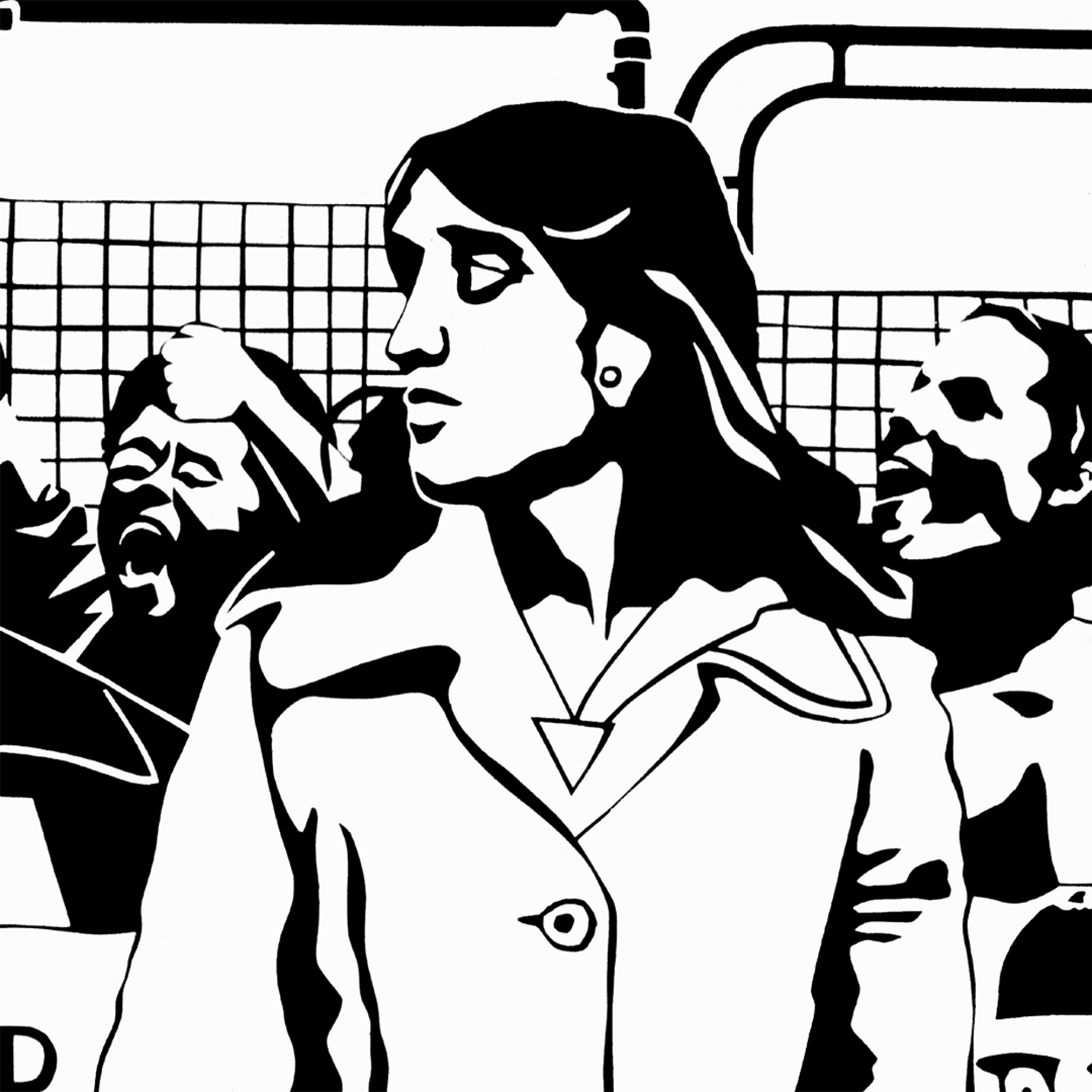by Hassan Mahamdallie
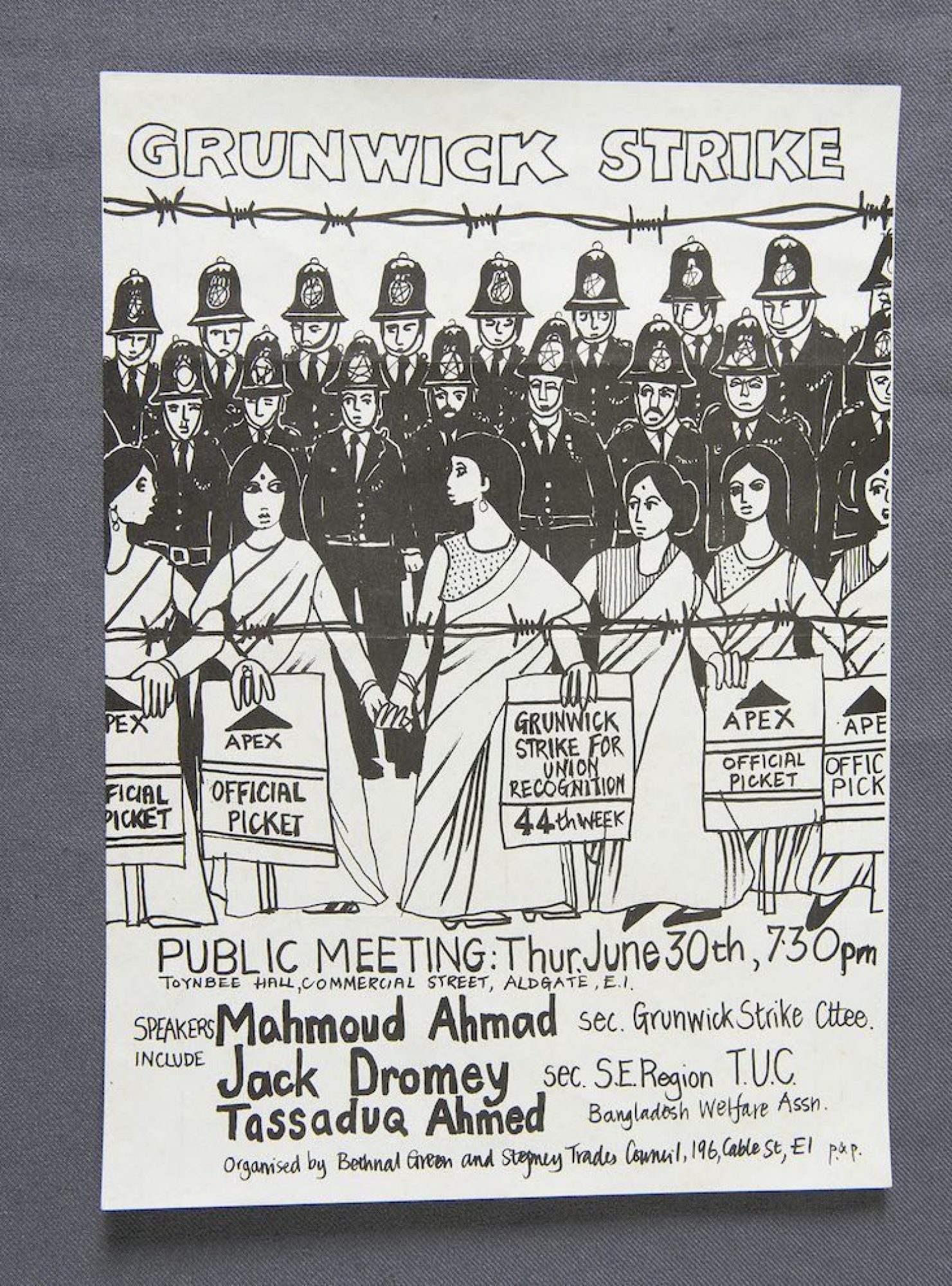
Grunwick Strike Poster by Dan Jones: courtesy People’s History Museum. Copyright Dan Jones.
Endless August in the long hot summer of 1976.
In the Grunwick photo processing plant, the workforce, most of whom are East African Asian women, are slaving away developing rolls of film. Each job must be turned round in 24 hours and sent back in the post to the customer awaiting glossy snaps of family occasions and holidays. The women toil for pittance pay, made to work overtime, finishing late at night, then waiting exhausted for the last bus or tube train home, only to be back in harness early the next morning.
Day after day. Relentless.
The sticky heat that August is unbearable. The women work in rows of long tables, in a room with no windows, monitored by managers whose glass-fronted offices directly face them. Any infraction of the punitive rules, or any let up in the pace of work results in them being shouted at, their wages docked or the instant sack. Trade union membership is banned. The colonial-minded overseers have free-rein to bully and terrorise the Asian women, who have been recruited precisely because Grunwick’s owner sees the sari-clad women as pliable, meek, desperate for work and easy to exploit.
The factory is owned and run by a rich Anglo-Indian, George Ward, who uses the profits he squeezes out of his workforce to fund a lavish lifestyle that includes a string of thoroughbred racehorses. Ward is a prominent racegoer, often seen glad-ragging it with toffs and oil-sheiks in the parade ring at Royal Ascot and Newmarket.
“We had to put our hands up to go to the toilet. Pregnant women were not allowed to go to the antenatal clinic and women were refused time off to take their sick children to the doctor. We were insulted if we did not work harder,” recalled one of the workers, Jayaben Desai.
Throughout August, tensions have been brewing at the Grunwick factory in Chapter Road – located in a residential area of terraced houses and narrow streets, just a stone’s throw from Dollis Hill underground station in Brent, north west London. On Friday 20 August 1976, four young Asian men working in the mail order department walk out after one of them is sacked on the spot. They stand outside the factory gates, unsure at what to do next. What recourse do they have? Who should they turn to?
Soon after Jayaben Desai is collared by a supervisor as she packs up to go home. Taken into the office, Jayaben realises she too is up for the sack. She pulls open the door and shouts to her fellow workers in Gujarati, “My friends, listen. What is happening to me today will happen to you tomorrow”.
Jayaben is not in the mood to be pushed around. She and her fellow workers have already been through a lot. Jayaben Desai was born in Gujarat, northern India in 1933, into a high caste Hindu family, and moved with her husband to what is now Tanzania, before bigoted “Africanisation” policies saw them and tens of thousands of others driven out of the country. With no option but to flee to Britain they found themselves faced with racist immigration controls and hostility. This was the hey-day of demagogue Enoch Powell. After each of his race-baiting speeches racism would spike, and somewhere an Asian person would feel the kicks of National Front boot-boys or even the cold steel of a knife between their ribs.
In 1962 the Tory government had passed the openly discriminatory Commonwealth Immigrants Act. Harold Wilson’s Labour government further turned the screw in 1965 and then in 1968 buckled before hysteria stoked by Powell and rushed through parliament a law to limit East African Asians (who held UK passports) arriving. The following year Jayaben and her husband arrived in Britain.
Those who did get in settled mainly in London and the East Midlands where there was sweatshop work. Although many had arrived in Britain penniless and hesitant in their English, that did not mean they were pushovers. A contemporary study recorded, “The newcomers include traders, doctors, teachers, bank clerks, civil servants, motor mechanics and labourers. Most of the young people have received an English education”.
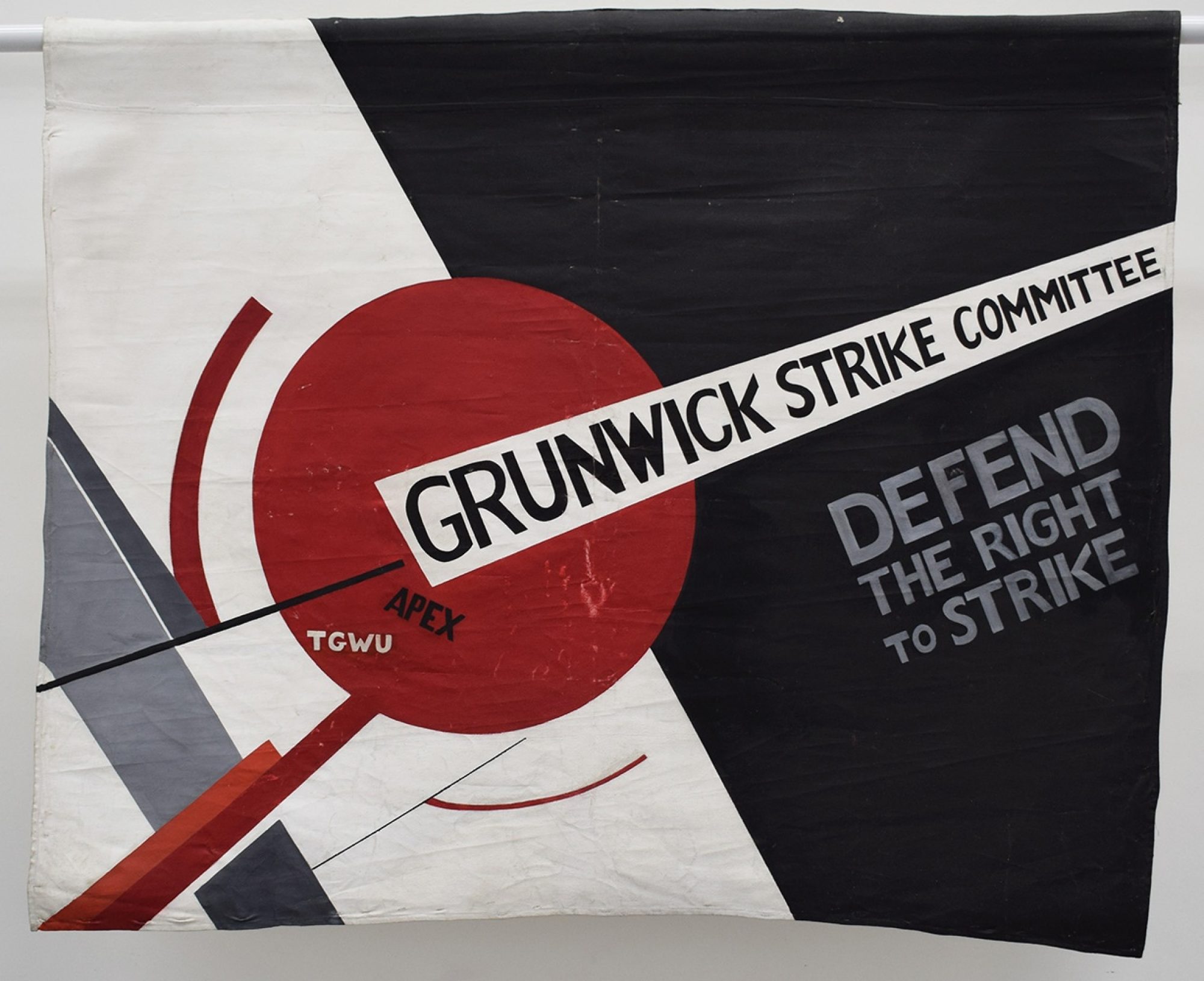
Grunwick Strike Committee Banner, designed by Jayandi and painted with Vipin Magdani, UK, 1976. Courtesy of People’s History Museum.
So Jayaben does not hold back. She draws herself up to her full height of four foot ten and fixes the six-foot-tall manager with a glare. “What you are running here is not a factory, it is a zoo. But in a zoo there are many types of animals. Some are monkeys who dance on your fingertips, others are lions who can bite your head off. We are the lions, Mr Manager”.
With that, Jayaben walked off the job and set in motion a monumental industrial dispute that would last 670 days, stretching into the summer of 1978. The Grunwick dispute would have national and historic repercussions, characterised by mass picketing, Yorkshire miners fighting hand-to-hand with the police, hundreds of arrests and hospitalisations, unofficial secondary strike action by post workers and rallies up and down the country where the Asian strikers would demand solidarity from thousands of rapt white manual workers.
The dispute would plunge the fag-end of a failing Labour government, in hock to the International Monetary Fund and the World Bank, into disarray, and put the cowardice of the trade union leadership on open display. It is the Trade Union Congress’s reluctance to deliver the solidarity needed, that ultimately defeats the strikers.
At the storm-centre of all this was Jayaben Desai, who at times seemed single-handedly to carry the strike and the conscience of the British labour-movement on her small shoulders.
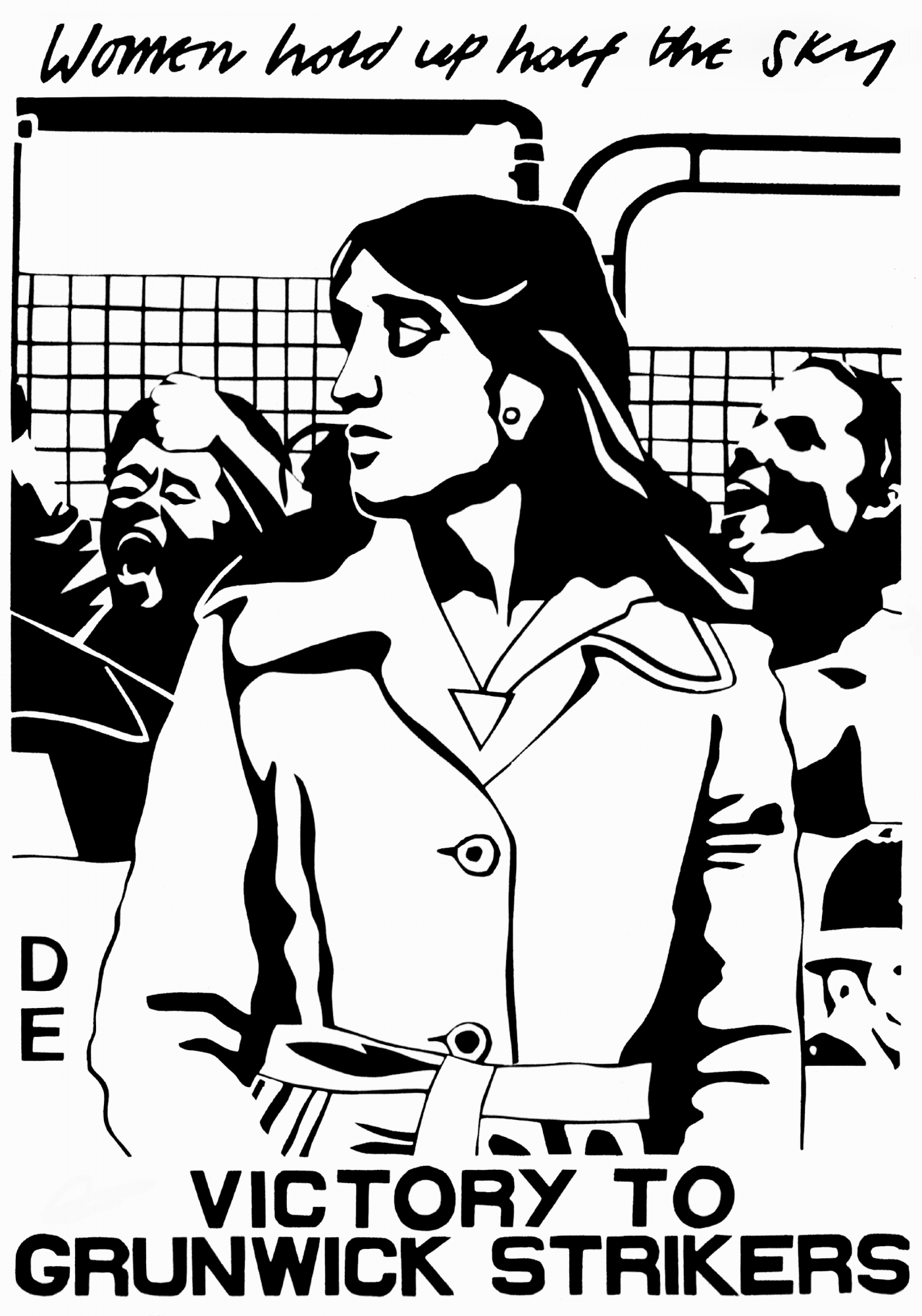
Victory To The Grunwick Strikers poster, 1977, by The Poster Collective.
After she had delivered her “we are the lions” parting shot, Jayaben and her son Sunil, who also worked in the department, joined the four men at the gates. The following Monday Jayaben and the others, waving homemade placards, picketed out hundreds of the other workers. They signed up to the white-collar trade union APEX, who made the strike official and demanded that Grunwick recognise it. The dispute was under way.
There had been previous strikes by black and Asian workers, but the response of the trade unions to them had been patchy at best and racist at worst. The Red Scar Mill strike in Preston in 1965, the 1972 strike of East African Asians at Mansfield Hosiery Mill in Loughborough and the bitter 1974 Imperial Typewriters dispute in Leicester, were all undermined by lack of support by the trade union leaders and downright racism by the strikers’ white trade union workmates. The trade union movement had a lot to prove.
Those who visited the Grunwick picket line were taken with the steely determination that Jayaben Desai embodied. Balwinder Rana, who was then leader of the radical Indian Youth Federation, recalls that “Jayaben was always very confident and determined. She was very polite. She kept people around her motivated. She never really complained about anything.
“She was small in stature. I was a lot taller, so she would always look up to talk to me, but I never felt that I was looking down on her. She felt tall somehow to me. She was very charismatic. Jayaben had a very confident voice, and she would sternly articulate her ideas.”
Every day Jayaben, when not on the picket line, would hold court in the front room of a house nearby, where the often-hostile press would grill her. “She could hold herself with anyone,” says Balwinder. “She was never intimidated even when the trade union leaders and Labour MPs came to her. She would always stand her corner.” So Jayaben spoke the truth when she told her managers, “A person like me, I am never scared of anybody.”
The dispute leapfrogged, with Ward sacking the strikers and replacing them with scabs, local post workers refusing to deliver the rolls of film to the factory, and then an “official enquiry” by the Labour government designed to can the strike. Various Tory MPs and shadowy ultra right-wing forces rallied to George Ward’s defence, taking out injunctions and organising strikebreaking.
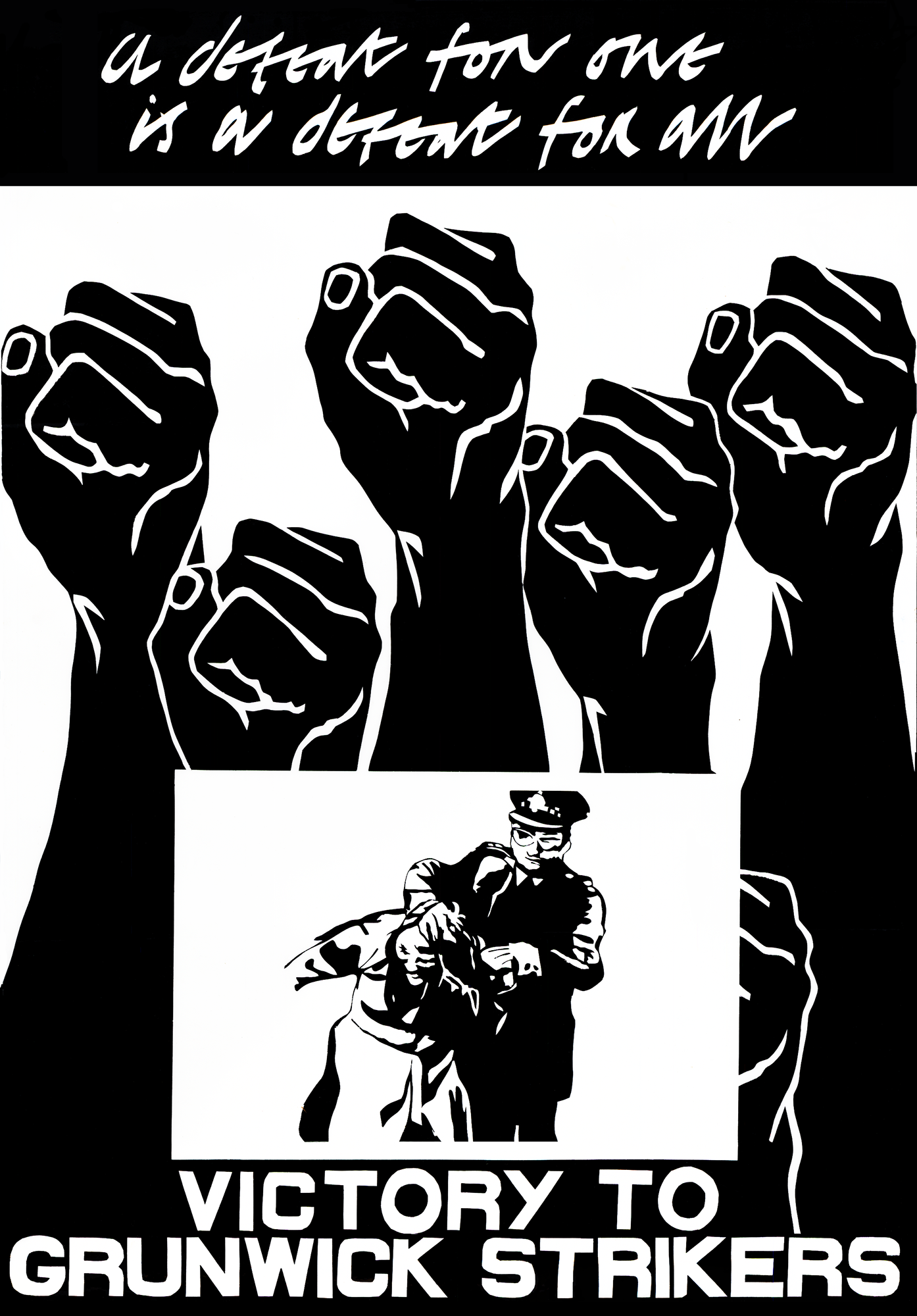
Victory To Grunwick Strikers poster, 1977, by The Poster Collective.
In the summer of 1977 the unions’ rank-and file responded to a call from the Grunwick strike committee with a series of mass pickets, up to 20,000 strong; completely occupying Chapter Road and the surrounding area to stop scab workers being bussed through the factory gates.
Monday 13 June 1977, the first day, was designated a “women’s picket”. The police attacked it, arresting 40, kicking and punching people as they dragged them off to police vans. One policeman got hold of Jayaben Desai by the hair and dragged her across the road.
The scenes of police brutality and racism enraged the union movement. On 23 June 1977, Arthur Scargill, the militant leader of the powerful Yorkshire miners, came to the picket line with his unions members from the coalfields. Mounted police, finding themselves facing thousands of pickets who were more than ready to take them on, were forced to retreat.
“The day the miners came,” recounts Balwinder, “was really fantastic. The Yorkshire miners were big, burly men, and they got off their coaches and ran straight into the police lines. For the first time I saw the police scared. That day the scab coaches did not go through. For years we had been arguing for unity and that ‘the workers united would never be defeated’, and we could see that in front of our eyes. But the TUC and the Labour government never delivered what was needed to win”.
A month later many of those same demonstrators would break through police lines protecting a National Front march through multicultural Lewisham, south east London, and give the fascists (who up to that point had been growing in confidence) a thrashing.
A Day Of Action was called for 11 July with 20-30,000 trade unionists including car workers, dockworkers and miners gathering from across the UK. But the mass picket was split by the trade union leaders who organised an official march away from the Chapter Road gates.
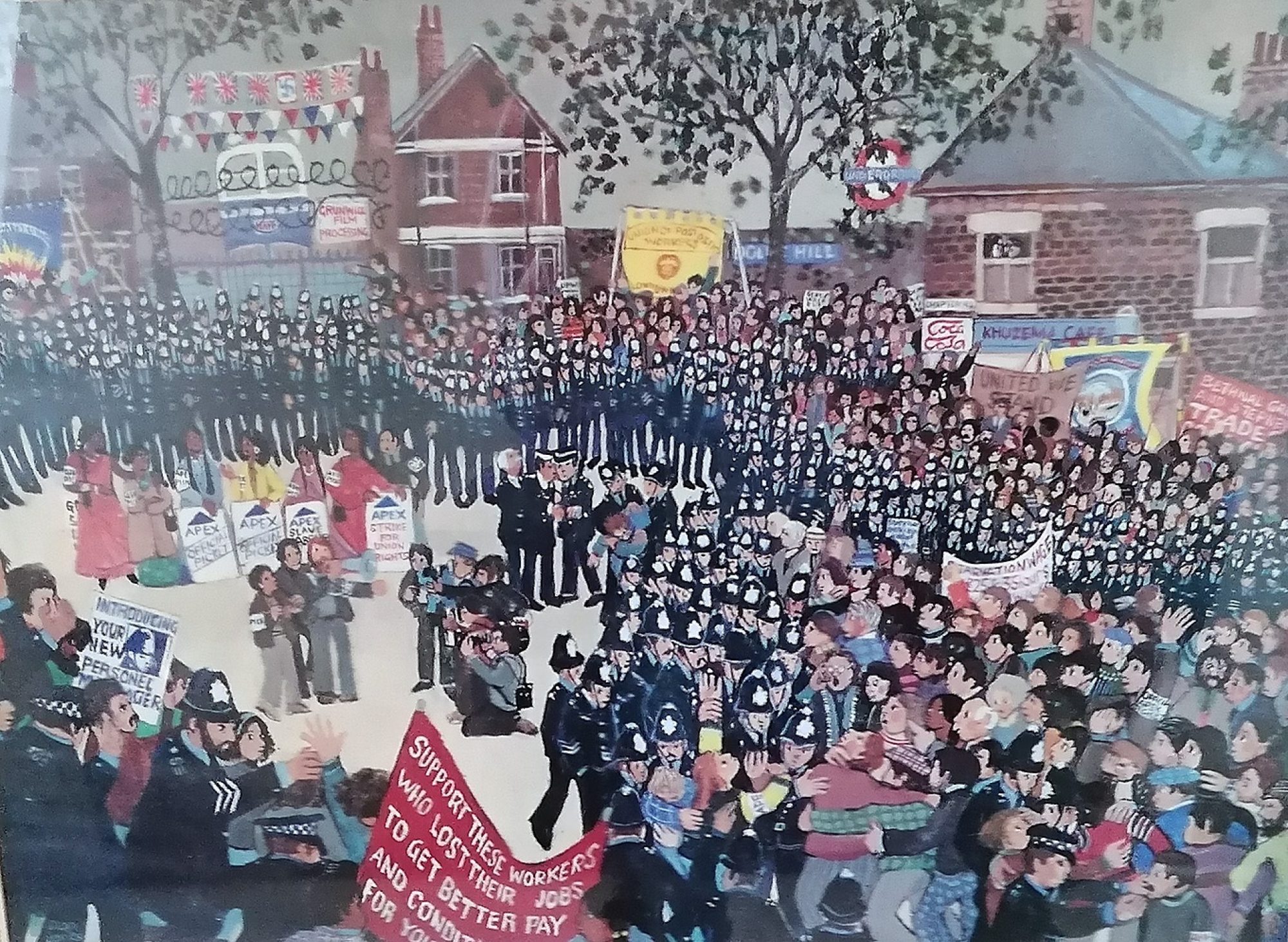
Grunwick Picket Line by Dan Jones, courtesy People's History Museum. Copyright Dan Jones.
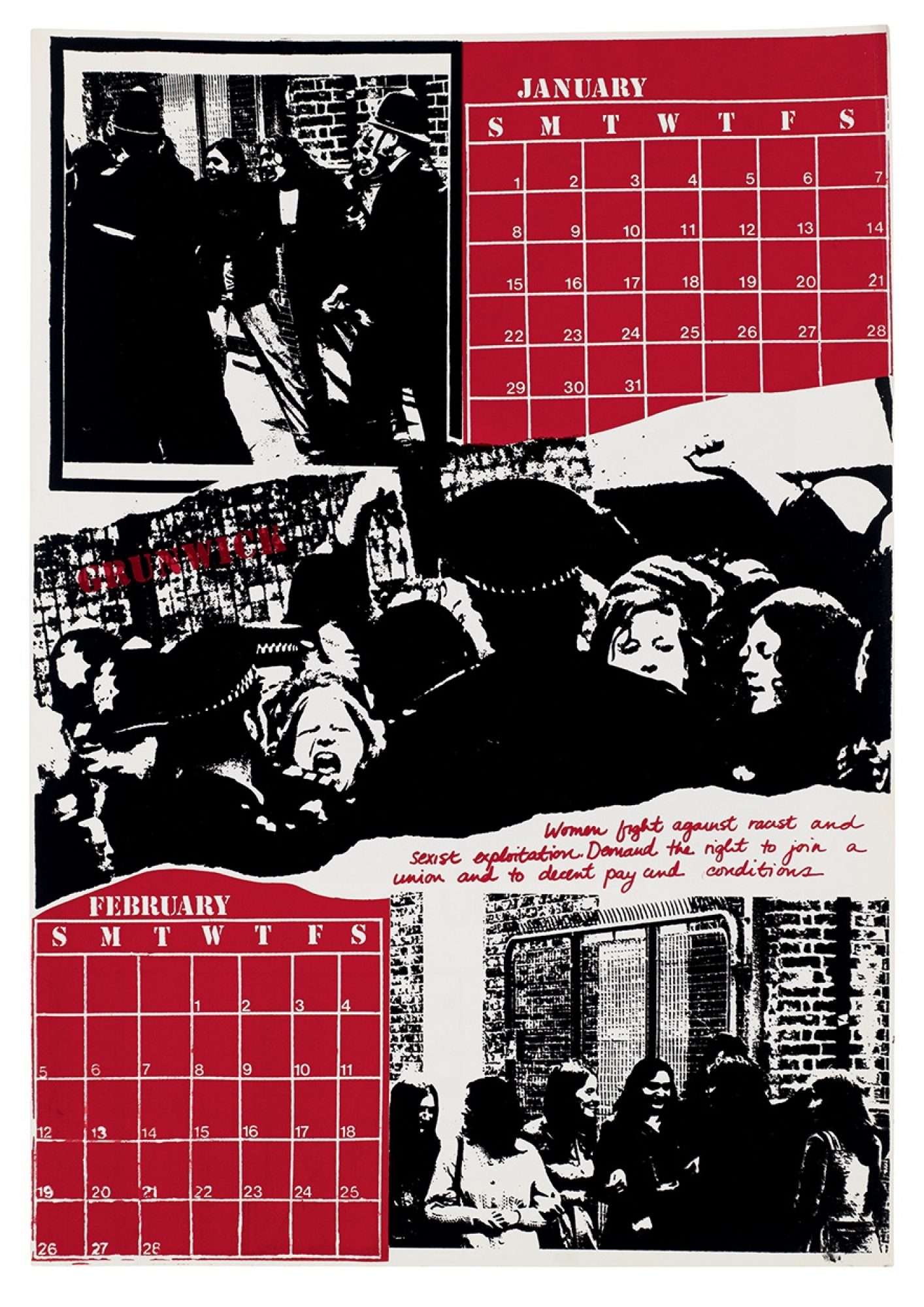
A page from the 1978 calendar by See Red Women's Workshop highlighting the strike at Greenham.
The strike was officially wound up in July 1978. But Jayaben Desai and her comrades had forever banished the myth of the passive, unorganisable and traditional Asian woman. The solidarity the dispute attracted did much to erase the painful memory of disputes in the past.
And what a fight it was. There is memorable footage of Jayaben Desai at a mass picket, a broad grin on her face, dressed in a woolly hat, scarf, check overcoat with a yellow sari poking out from underneath and a black handbag on her arm. Her eyes are sparkling. She is in the moment. Months before Jayaben Desai died in December 2010 she was asked by journalist Sarfraz Manzoor what it felt to be ‘part of history’. “I am proud of what I did. They wanted to break us down, but we did not break.”
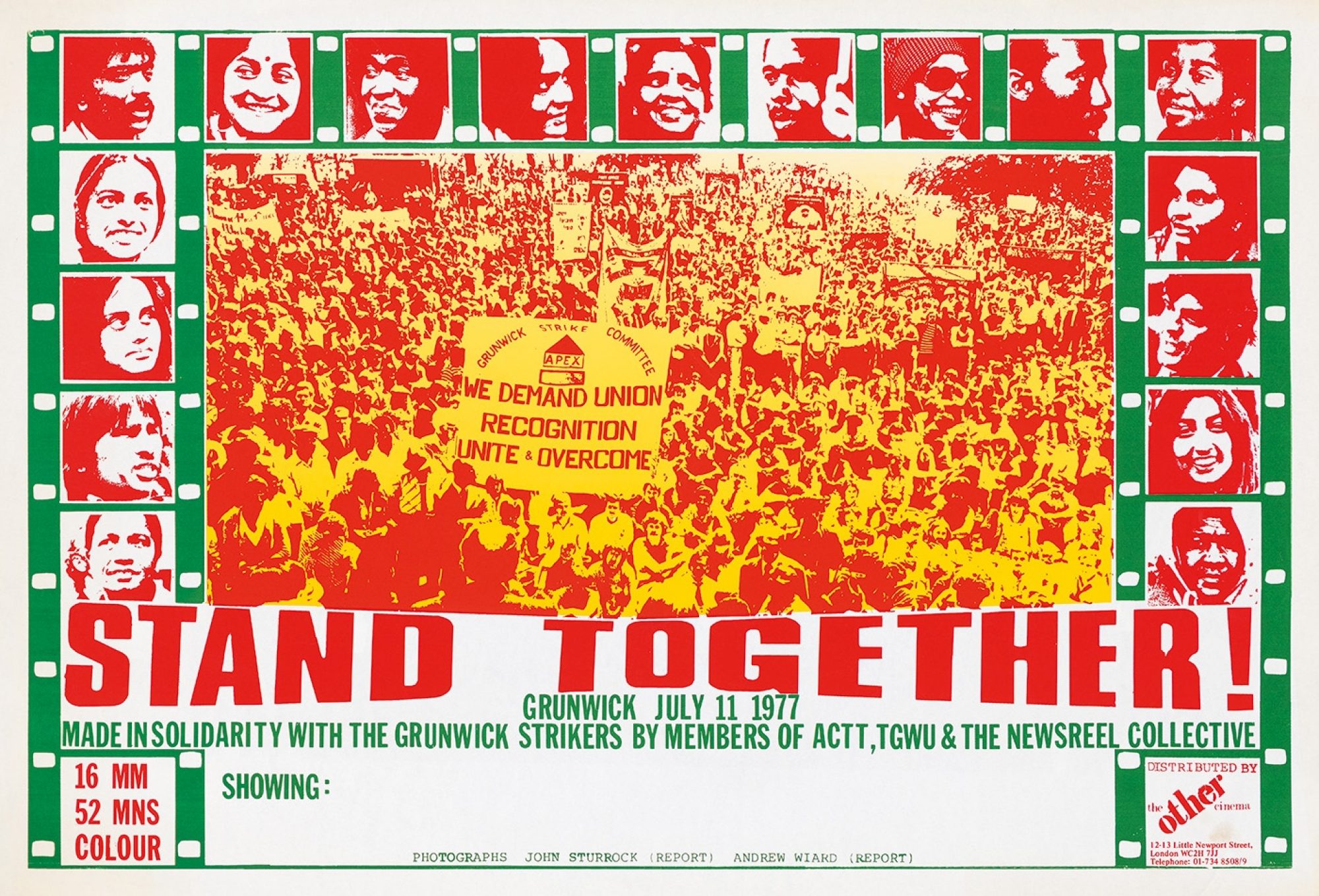
Poster, made by Paddington Printshop, for the Newsreel Collective's film Stand Together, about the Grunwick strike.
About the writer:
Hassan Mahamdallie was born in London into a large working-class Indo-Trinidadian/English family. He is a playwright, writer, activist and specialist in diversity and art. He is a former Director of the Muslim Institute and helps edit its journal Critical Muslim. He is the founder of radical theatre company Dervish Productions, whose mission is ‘to amplify voices from the edge’. He has written extensively on Black British History, the Stephen Lawrence affair, Muslim politics and culture and Black deaths in custody. He is the author of a political biography of William Morris. His educational pamphlet Black British Rebels: Figures From Working Class History that tells the stories of key leaders from Olaudah Equiano to Jayaben Desai, was republished by Bookmarks in 2021.
Images featured from:
People's History Museum (click to find out more)
The Poster Collective (click to find out more)
See Red Women's Workshop (click to find out more)
Paddington Printshop (click to find out more)
With special thanks to Christine Halsall of The Poster Collective, Sam Jenkins and Jenny Mabbott at the People's History Museum.
